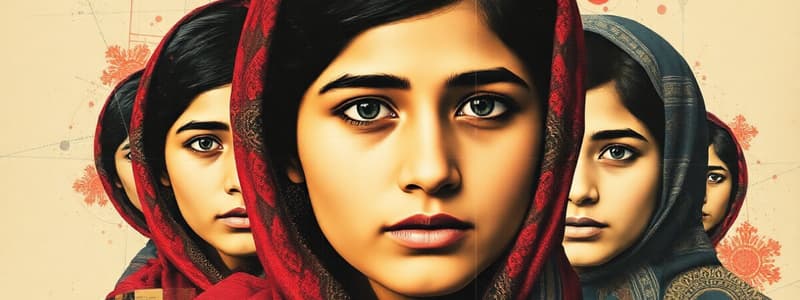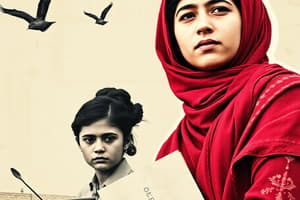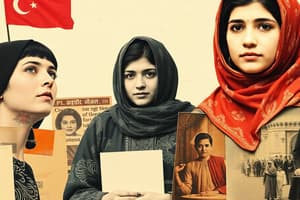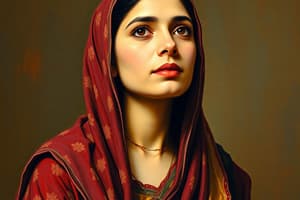Podcast
Questions and Answers
Considering Moniba's reaction to the revelation of Malala's secret diary, which of the following psychological mechanisms MOST accurately describes her initial response?
Considering Moniba's reaction to the revelation of Malala's secret diary, which of the following psychological mechanisms MOST accurately describes her initial response?
- Attachment insecurity triggering a fear of abandonment, compounded by a sense of exclusion from a significant aspect of Malala's life.
- Projection of her own fear and insecurities onto Malala, manifesting as anger due to Malala's perceived recklessness.
- Cognitive dissonance arising from the conflict between loyalty and perceived betrayal, leading to temporary emotional dysregulation. (correct)
- Reaction formation, where underlying feelings of admiration and envy are masked by outward displays of anger and rejection.
Given the context of the diary's accidental exposure by Malala's father, which ethical framework BEST elucidates the competing moral imperatives at play?
Given the context of the diary's accidental exposure by Malala's father, which ethical framework BEST elucidates the competing moral imperatives at play?
- Utilitarianism, where the unintended revelation, despite potentially increasing Malala's risk, ultimately maximizes the overall good by amplifying the message of girls' education.
- Virtue ethics, emphasizing the father's lack of practical wisdom (phronesis) in inadvertently jeopardizing his daughter's safety through a seemingly innocuous disclosure.
- Care ethics, highlighting the disruption of relational trust between Malala and her father due to the unintentional revelation.
- Deontology, where the father's unintentional breach of confidentiality clashes with the intrinsic duty to protect his daughter from harm, regardless of consequences. (correct)
Counterfactually, had Malala's mother explicitly forbidden her from appearing on television and actively enforced traditional norms, what potential long-term societal impact could MOST reasonably be inferred, considering the prevailing socio-political climate?
Counterfactually, had Malala's mother explicitly forbidden her from appearing on television and actively enforced traditional norms, what potential long-term societal impact could MOST reasonably be inferred, considering the prevailing socio-political climate?
- An enhanced perception of familial unity and adherence to cultural values, strengthening social cohesion and mitigating the risk of backlash from conservative elements within the community.
- An exacerbation of internal conflict within Malala, potentially leading to psychological distress and a diminished capacity for future activism due to the suppression of her personal agency.
- A substantial reduction in international attention and support for girls' education in Pakistan, leading to the normalization of oppressive practices due to the absence of a visible, relatable advocate. (correct)
- A shift in advocacy strategies towards more decentralized, grassroots movements prioritizing community-led initiatives over individual public profiles, fostering greater local ownership and sustainability.
Considering Malala's defiant stance against Fazlullah's men wearing masks, which rhetorical device does she MOST effectively employ to underscore the moral contrast between herself and her oppressors?
Considering Malala's defiant stance against Fazlullah's men wearing masks, which rhetorical device does she MOST effectively employ to underscore the moral contrast between herself and her oppressors?
Assuming Fazlullah's primary objective was the complete eradication of female education in Pakistan's Swat Valley, which strategic vulnerability inherent in his approach could a well-informed counter-insurgency campaign MOST effectively exploit?
Assuming Fazlullah's primary objective was the complete eradication of female education in Pakistan's Swat Valley, which strategic vulnerability inherent in his approach could a well-informed counter-insurgency campaign MOST effectively exploit?
What philosophical argument could be mounted to defend the actions of Malala's mother, even if she privately disagreed with Malala's public appearances, based solely on the provided text?
What philosophical argument could be mounted to defend the actions of Malala's mother, even if she privately disagreed with Malala's public appearances, based solely on the provided text?
If a social scientist were to analyze the reactions of Malala's mother's friends through the lens of framing theory, which frame would BEST characterize their criticism of Malala's public visibility?
If a social scientist were to analyze the reactions of Malala's mother's friends through the lens of framing theory, which frame would BEST characterize their criticism of Malala's public visibility?
Considering the narrative context, which psychological defense mechanism is MOST likely being employed by those who criticize Malala for showing her face on television, while Fazlullah's men wear masks?
Considering the narrative context, which psychological defense mechanism is MOST likely being employed by those who criticize Malala for showing her face on television, while Fazlullah's men wear masks?
Given the historical and cultural context of the narrative, which sociological theory BEST explains the tension between Malala's advocacy for girls' education and the traditional norms upheld by some members of her community?
Given the historical and cultural context of the narrative, which sociological theory BEST explains the tension between Malala's advocacy for girls' education and the traditional norms upheld by some members of her community?
Assuming that Malala continued to advocate for girls' education while consistently violating local customs and traditions, which long-term consequence is the LEAST likely outcome for her and her family?
Assuming that Malala continued to advocate for girls' education while consistently violating local customs and traditions, which long-term consequence is the LEAST likely outcome for her and her family?
Flashcards
Gul Makai
Gul Makai
The pseudonym used by Malala for her diary entries.
Fazlullah
Fazlullah
A militant leader trying to shut down girls' schools in Pakistan.
Identity
Identity
The qualities and beliefs that make a person who they are.
Voice for girls' education
Voice for girls' education
Signup and view all the flashcards
Public perception
Public perception
Signup and view all the flashcards
Courage
Courage
Signup and view all the flashcards
Secrecy
Secrecy
Signup and view all the flashcards
Societal expectations
Societal expectations
Signup and view all the flashcards
Empowerment
Empowerment
Signup and view all the flashcards
Activism
Activism
Signup and view all the flashcards
Study Notes
Malala's Experiences and Father's Actions
- Malala's best friend, Moniba, was angry when Malala confessed a secret
- Malala's father revealed a secret in conversation with a reporter
- A man threatened Malala's father's daughter (Malala), causing him to speak to the reporter
- Malala's father's concerned for her
- The diary played a significant role in raising awareness
- Reportage on the situation was published in the New York Times.
Reactions to Malala's Actions
- People's reactions after Malala's interviews
- Some people thought Malala had done well
- Many of Malala's mother's friends were critical of her actions
- Some people were scandalized by her appearance on television
- Malala's mother supported her decision.
Malala's Perspective
- Malala's friends questioned her decision to show her face
- Malala stated that the Taliban wore masks because they are criminals
- Malala is proud to speak out for girls' education
Summary
- Malala's father revealed the threat to her life in a discussion with a reporter
- The diary had a significant influence on the issue of girls' education
- Many people criticized Malala's actions and her mother never outwardly expressed agreement or disagreement.
Studying That Suits You
Use AI to generate personalized quizzes and flashcards to suit your learning preferences.




